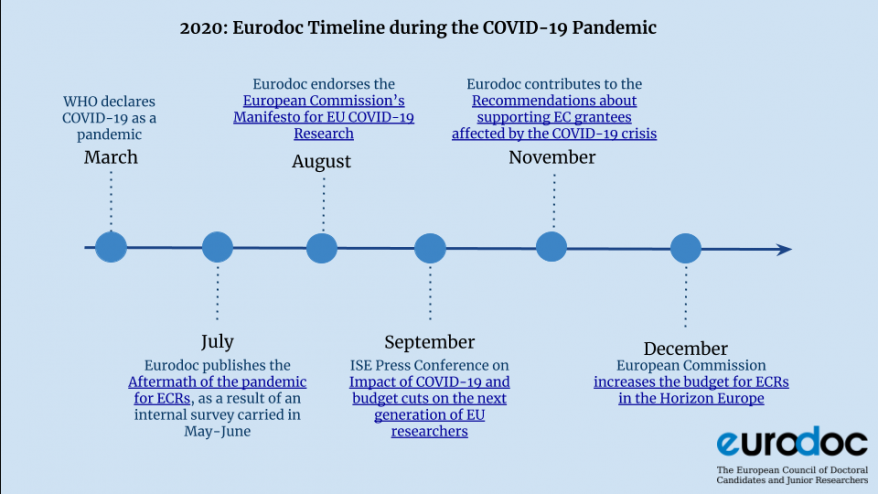As the year comes to a close, we can reflect on one of the most challenging for education and research in the recent past. Thousands of researchers worked tirelessly to fight the COVID-19 pandemic, yet, at the same time, most Early Career Researchers (ECR) are facing grim career perspectives, as well as job- and funding cuts, and growing issues in their daily working conditions. Paradoxically, ECRs’ working conditions in all research fields significantly worsened exactly when their work mattered the most.

Please see attachment below for the infographics with clickable links.
Eurodoc focused its attention in 2020 on the severely-impacted living and working conditions for ECRs since the onset of the COVID-19 pandemic. During May and June, Eurodoc collected contributions from its members, 28 National Associations representing ECRs in Europe. We subsequently reported on several issues consistently affecting the work and careers of ECRs in the article “The aftermath of the pandemic for early career researchers in Europe”, published on 6 July 2020. In this article, we highlighted how the “new normal” of working-from-home negatively affected most ECRs, who lack an adequate working environment and access to essential research resources. Bureaucratic requirements about doctoral training also present an obstacle for doctoral candidates: most of them experience issues with remote supervision practices, lack interaction with mentors or, on the contrary, experience increased pressure from them. The unclear future of EU research funding and the growing concerns about career progression leads to an increased sense of isolation and anxiety, thus lowering ECRs productivity. These issues impacted more on ECRs with caring responsibilities and with disabilities, which we explored in two dedicated articles. Despite our call on EU institutions to elaborate a post-pandemic plan for ECRs in Europe, this has yet to materialize.
2020 also marked the end of the Horizon 2020 framework programme for research and innovation, and saw the final agreement on its seven-year successor, Horizon Europe. Whilst the EU Parliament called for a budget of 120bn euros for Horizon Europe, the programme was the main victim of EU budget cuts, which were barely offset by funds from NextGenerationEU. During all the discussions on the research budget, Eurodoc closely cooperated with the Young Academy of Europe (YAE), the Marie Curie Alumni Association (MCAA) and the Initiative for Science Europe (ISE) to express the concerns of all European ECRs to the highest EU institutions. In September, when budget figures reached the lowest figure of 75bn euros, Eurodoc participated in a press conference organized by ISE to call for a budget on par with EU ambitions for research, featuring ERC Acting-President Prof. Jean-Pierre Bourguignon. Together with the aforementioned organisations, Eurodoc also contributed to Recommendations about supporting EC grantees affected by the COVID-19 crisis, published by ISE on 16 November 2020. In subsequent conferences and meetings with the European Commission and stakeholders, Eurodoc called for more attention on the pandemic impact on ECRs, asking to fund contract extensions for all EU research programmes. We also pushed for greater investments in career development and to rethink project-based funding, stating these aspirations in the Nature Career Podcast. A deal on the Horizon Europe research programme was finally announced on 11 December, with a top-up of several billion euros, addressed to the two main funding programmes for ECRs: ERC and MSCA. However no additional support for grantees of European research programmes is included in the deal.
Finally, Eurodoc endorsed the European Commission’s Manifesto for EU COVID-19 Research and joined the Open Research Europe (ORE) project as an active partner, helping build a platform to publish research outputs from Horizon research projects.
"One of the few positive aspects in the COVID-19 pandemic, is that it proved the positive effect of Open Science in the research lifecycle and professional development of individual researchers", said Giulia Malaguarnera, President of Eurodoc. “Open Access and preprint publishing played a key role in boosting the scientific response to the pandemic: Open Science is triggering deep changes in research culture, and ECRs are ready for them!"
Eurodoc in Press (Links):
- Researchers with young children ‘hit harder’ by Covid-19, Research Professional News, 26 May 2020
- University and researcher groups set out implications of Covid-19, Research Professional News, 7 July 2020
- Covid-19 could worsen digital divide, Research Professional News, 17 September 2020
- ISE Press Conference Video
- Italian Press: Sole 24 Ore and La Repubblica, 30 September 2020
- Un budget européen en trompe-l’œil pour la recherche, Le Monde, 4 October 2020
- The career costs of COVID-19: how postdocs and PhD students are paying the price, Nature Career Podcast, 25 November 2020

